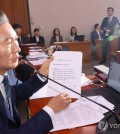- California Assembly OKs highest minimum wage in nation
- S. Korea unveils first graphic cigarette warnings
- US joins with South Korea, Japan in bid to deter North Korea
- LPGA golfer Chun In-gee finally back in action
- S. Korea won’t be top seed in final World Cup qualification round
- US men’s soccer misses 2nd straight Olympics
- US back on track in qualifying with 4-0 win over Guatemala
- High-intensity workout injuries spawn cottage industry
- CDC expands range of Zika mosquitoes into parts of Northeast
- Who knew? ‘The Walking Dead’ is helping families connect
S. Korea’s land prices edge up in Q1
SEJONG (Yonhap) — South Korea’s average land prices continued its upbeat trend in the first quarter of this year amid government efforts to boost the local property market, data showed Tuesday.
The average land price for the country’s 17 major cities and provinces rose 0.56 percent during the January-March period, accelerating from a 0.48 percent on-year gain for the same period last year, according to the data compiled by the Ministry of Land, Infrastructure and Transportation.
The first-quarter jump marked the steepest gain since the first quarter of 2008 when average land prices soared 1.23 percent before the 2008 global financial crisis. The figure dropped 1.2 percent a year later.
Rural areas led the overall uptick as they jumped 0.74 percent during the cited period, outpacing a 0.46 percent rise in the capital region that includes Seoul and its surrounding areas.
Land prices in Jeju, the country’s southernmost resort island, soared 3.65 percent as the government’s latest plan to build a second airport there, coupled with a flood of Chinese investors, boosted its real estate market.
Sejong, the administrative city located in the central region, saw its property market advance 0.89 percent over the cited period on rising demand for new apartments.
South Korea has made constant efforts to revive the local real estate market for a few years, lowering financial barriers for mortgage borrowers. Also, the central bank has kept its policy rate at a record low of 1.5 percent since June 2015.
As a result, the number of home transactions surged 18.8 percent on-year to a record 1,193,691 last year.
But for the first three months of the year the figure slumped 26.1 percent on-year due to the government’s move to tackle household debt, which surpassed a record 1,200 trillion won level (US$1 trillion) last year.












